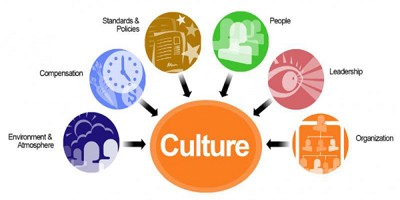Culture consists of the beliefs, behaviors, objects, and other characteristics common to the members of a particular group or society. Through culture, people and groups define themselves, conform to society’s shared values, and contribute to society. It is the ideas, customs, and social behavior of a particular people or society. Thus, culture includes many societal aspects: language, customs, values, norms, mores, rules, tools, technologies, products, organizations, and institutions. Sociologists define society as the people who interact in such a way as to share a common culture. The cultural bond may be ethnic or racial, based on gender, or due to shared beliefs, values, and activities. Culture is a key component in business and has an impact on the strategic direction of the business. It influences management, decisions, and all business functions from accounting to production. It affects the organization’s productivity and performance and provides guidelines for customer care and service, product quality and safety, attendance and punctuality, and concern for the environment.

Fig: Cultural aspects
So, Culture can be defined as the language, norms, values, beliefs, and more that, together, form a people’s way of life. It is a combination of elements that affect how people think, how they act, and what they own. American culture, for instance, includes everything just mentioned. It also includes others history, architecture, accepted behavior, and so much more.
















